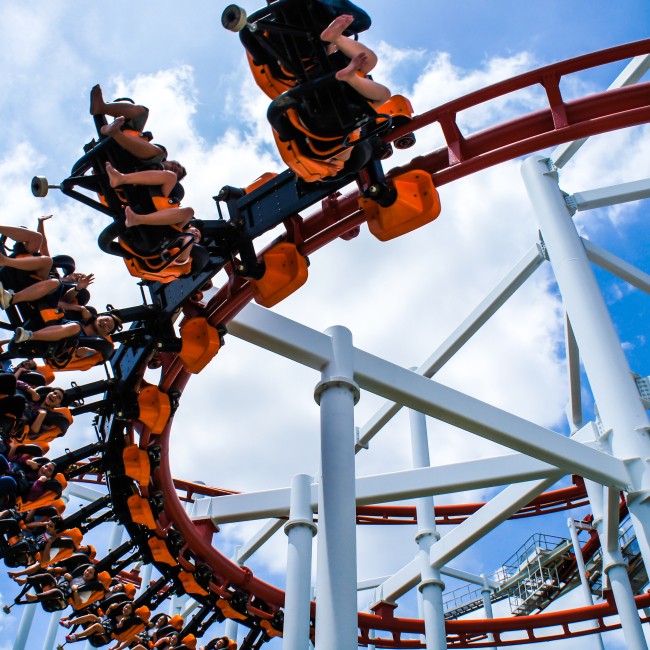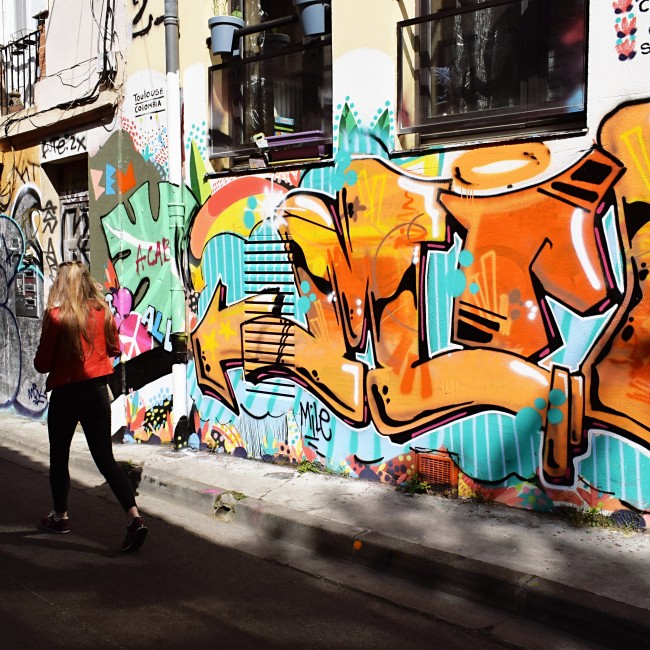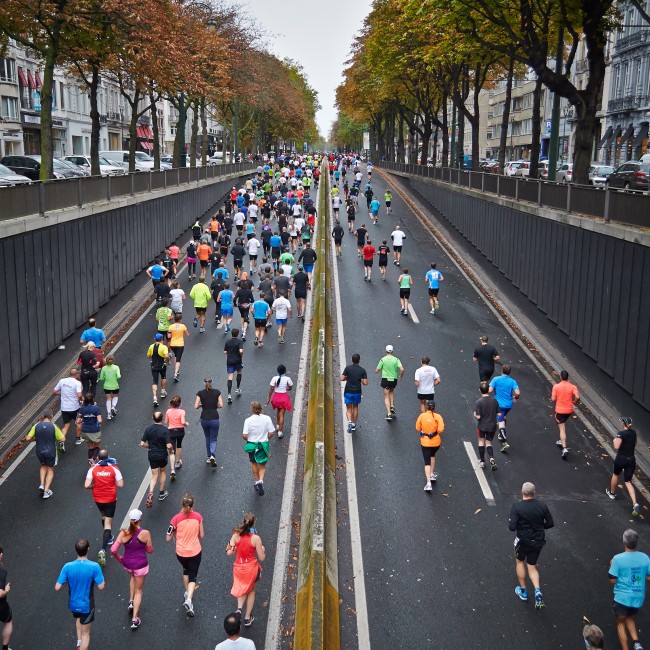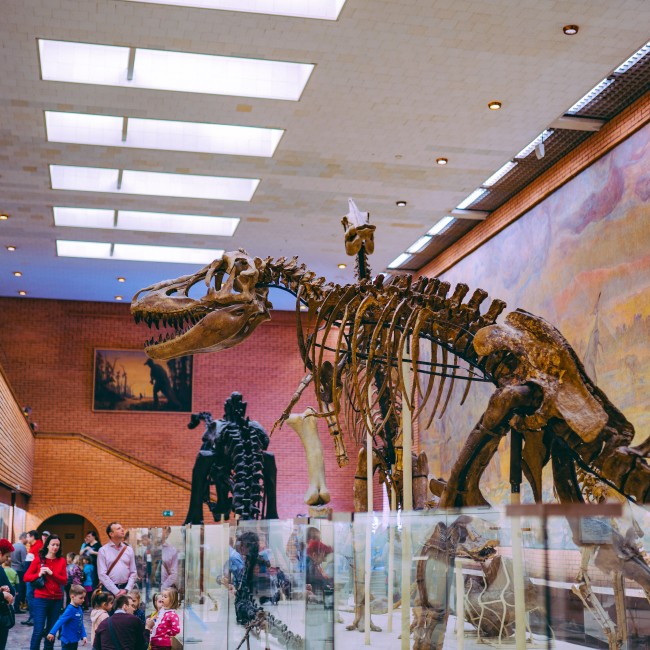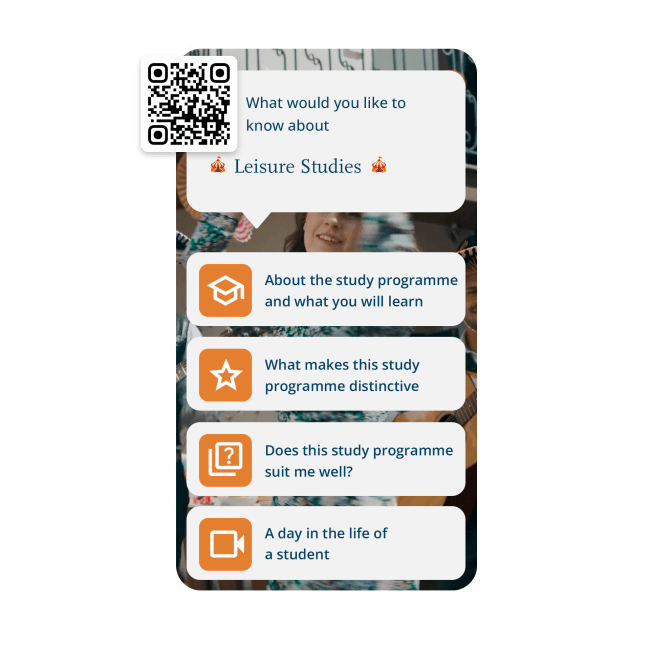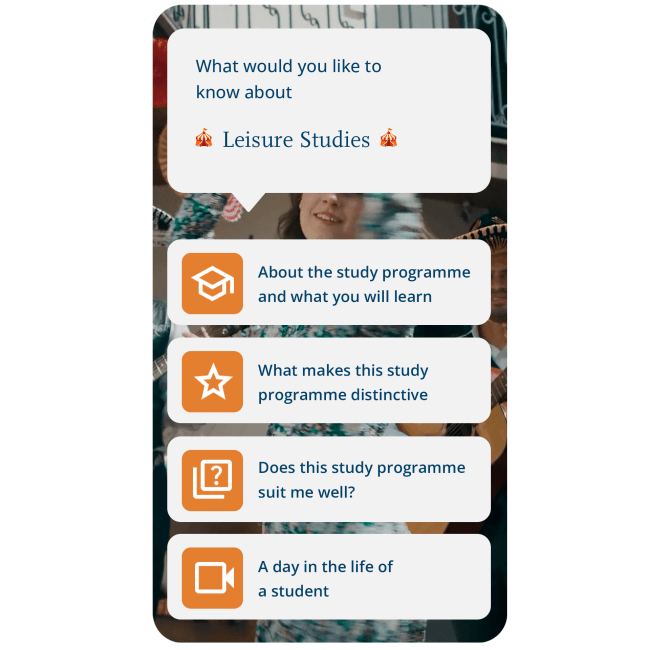Come and meet us
Walking around on campus is the best way to truly experience BUas. Sign up for one of the upcoming events or activities.
Discover the Bachelor of Science Leisure Studies programme
Discover the Bachelor of Science Leisure Studies programme in an interactive story. Swipe through the shorts, see what you can become later and take the quiz to see if this study suits you!
Check out the interactive storyStudy overview
Years 1, 2 and 3
Below we explain what you can expect in each year.
- Year 1
Introduction to the core disciplines of the leisure field
In the first year, you will be introduced to the diversity of the field. You will study subjects such as sociology, anthropology and psychology, as well as economics and marketing. You will also work on your research skills and learn about methods, techniques and statistics.
In some courses, the emphasis is on consumer perception from a social science perspective. Other modules focus more on the business side. You will learn how to put your knowledge into practice straight away.
- Year 2
In the second year, you will strengthen your knowledge on what kinds of activities people choose in their leisure time, and how companies can organise those activities and profit from them. In addition to theoretical lectures, practical seminars, debates and case studies, you will work on several projects for commissioners from the leisure field. In these projects, you will apply the research techniques and theoretical insights learnt in the various courses.
- Year 3
In the first half of this year (semester 5), you can opt for a work placement or a minor. For the minor, you put together your own set of subjects at another university in the Netherlands. It is also possible for you to attend the minor at one of our partner universities abroad. In the sixth and final semester, you will apply everything you have learned by:
- considering leisure preferences, activities, networks and impacts from all angles. These leisure practices involve complex collaboration processes, for instance in the development of urban space and city culture;
- considering leisure activities across different cultures; studying fundamental philosophical questions about the relevance of leisure and the ethical questions it raises;
- investigating the contribution leisure can make to the development of urban space and city culture;
- In the last semester, you will write a thesis, in which you will investigate a complex leisure issue. Topics for the bachelor's thesis can be connected to current research being conducted by members of staff.
During the study Bachelor of Science Leisure Studies you can expect, among others, the following courses.
- Project Mixed Methods
In this course, you work in groups on a research project that utilises a mix of research methods. This mix includes both qualitative techniques (interviews, participant observation) and quantitative techniques (surveys, statistics). For this research, you will write a short report, create a poster, and undergo an oral examinationa. An example of a research project conducted in this course is studying the social impact of the Dutch Grand Prix in Zandvoort on the local environment.
- Experience Measurement & Design
Experience is one of the key concepts in the realm of leisure. In this course, you will learn not only about the role of experience in the economy and society but also within individuals' lives. You will also learn what constitutes an experience and how to design leisure products to achieve the desired experience. Additionally, you will explore how to measure experiences during leisure activities using some of the latest research techniques, such as heart rate, skin conductance, and brain activity.
- Leisure and Making Places
Leisure utilises spaces primarily for consumption but also contributes to the creation of places that significantly enhance the quality of the spatial environment. Therefore, leisure is considered an important pillar within placemaking. In this course, you will study placemaking from various theoretical perspectives. You will also visit several placemaking initiatives in the Netherlands and the surrounding area to firsthand experience how theory comes to life.
Teaching method
A number of teaching methods are used within the bachelor's programme in Leisure Studies. Given the academic nature of the programme, much of the teaching involves traditional lectures and independent study of academic literature such as books and articles. In addition, you will have seminars in which you work on assignments.
Other teaching methods include preparing a personal portfolio, conducting research in project groups, participating in a debate, preparing and giving a presentation to fellow students and sometimes even presenting your own research to representatives from the leisure industry.
Study load and coaching
The average study load for this programme amounts to approximately 40 hours a week, during 42 weeks. How many hours a week you actually spend on studying differs per week and depends greatly on the type of person you are. The last weeks of a term and the exam weeks are relatively busy.
Coaching
You can always contact your lecturers if you have any questions. The programme is characterised by a close-knit community of lecturers and students.
- A typical week
Each week is arranged differently. The number of days with classes varies from week to week. Below is an example of a typical week.
Monday
- 09.00 – 11.00 hrs: Lecture on the influence of cultures on leisure
- 11.00 – 13.00 hrs: Seminar on statistics
- 14.00 – 16.00 hrs: Lecture on the organisation of the leisure sector
Tuesday
- 10.00 – 12.00 hrs: Seminar on shopping area vacancy in the city centre
- 14.00 – 16.00 hrs: LAB session on measuring emotions
Thursday
- 11.00 – 13.00 hrs: Group discussion on the application of psychology in leisure
- 14.00 – 16.00 hrs: Lecture on how to increase sustainability at festivals
Wednesday and Friday independent study (reading papers and books, preparing for examinations, and making assignments and reports)
Student well-being
BUas encourages and helps you to make the most of yourself, whatever your circumstances. Maybe you have a chronic illness, are a family carer, a competitive athlete, or juggle your studies with running your own business? Our study coaches, student counsellors and student psychologists are here to help. Do you need extra support or advice? Or extra facilities? Then take a look at the options here.
Field trips and excursions
In the Bachelor of Science Leisure Studies, you will go on a field trip. The location varies each time.
Student Frank, for example, went to Cologne. ‘We had a cool study trip to Cologne in Germany. We engaged in cultural, educational and social activities. Among other things, we did a city scavenger hunt, climbed the Cologne Dom and spent a day at Phantasialand. The unique aspect of our field trip is that it is organised by students for students.’
Besides a study trip, you will also visit companies or locations you are doing assignments for, so that you get a better understanding of the situation. For example, you may work on an assignment for the Open Air Museum in Arnhem or the Spoorzone in Tilburg.

Academic (wo) versus professional (hbo) education
Studying for a bachelor’s degree at ‘wo’ (academic) level is fundamentally different from studying at ‘hbo’ (professional) level. Here are the main differences explained:
- In an academic programme, you will do more research than in a professional programme, and you will learn how to use scientific theories and models. What’s more, you will learn to place issues in a broader societal perspective.
- An academic programme prepares you for a strategic role, in which analytical skills and critical reflection are key. A professional programme prepares you for an operational or management role.
- In an academic programme you will do a lot of literature research and write (individual and independent) research reports and papers. In a professional programme, you will often work in project groups with other students on practical assignments.
- A professional bachelor’s degree trains you to work in a specific sector, whereas an academic bachelor’s degree gives you more flexibility, as you will have learned to think and work from a broader perspective.
What makes this study programme unique?

Only academic leisure programme in the Netherlands
Leisure Studies is the only academic leisure-related degree programme in the Netherlands.

Teaching by real scientists
You will be taught by leading scientists in the field of leisure and tourism, who are themselves active researchers.
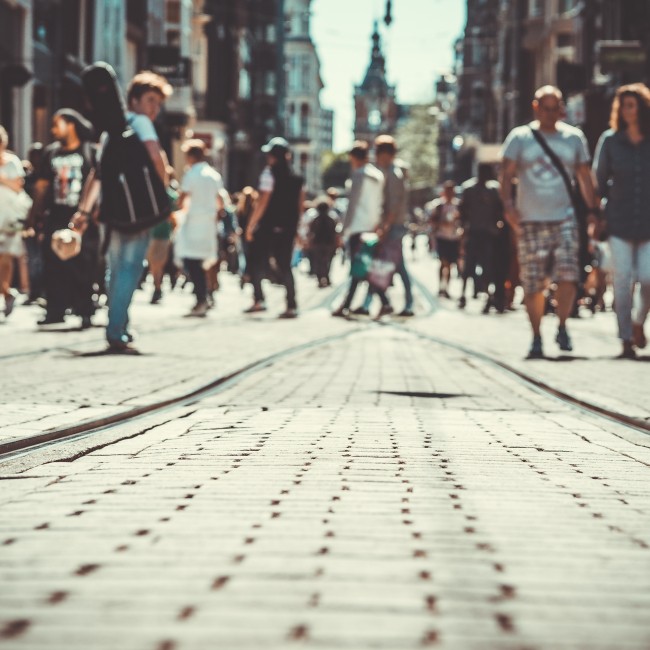
International exchange or placement
In your third year, you can do an exchange at one of our international partner universities or do a work placement.
Admission & application
What are the admission requirements?
To be admitted to this degree programme, you need a vwo diploma with an appropriate profile, or an equivalent of this Dutch diploma. If you do not meet these requirements, you can have a look at the options available to you.
Information about admission requirements
What does this study programme cost?
In the academic year 2025-2026 the tuition fee for bachelor's programmes is €2,601. In addition, you should take extra costs for software, excursions, etc. into account.
How can I apply?
If you meet the admission requirements, you can apply for this study programme. If you do so before 1 May, you can certainly start your studies.
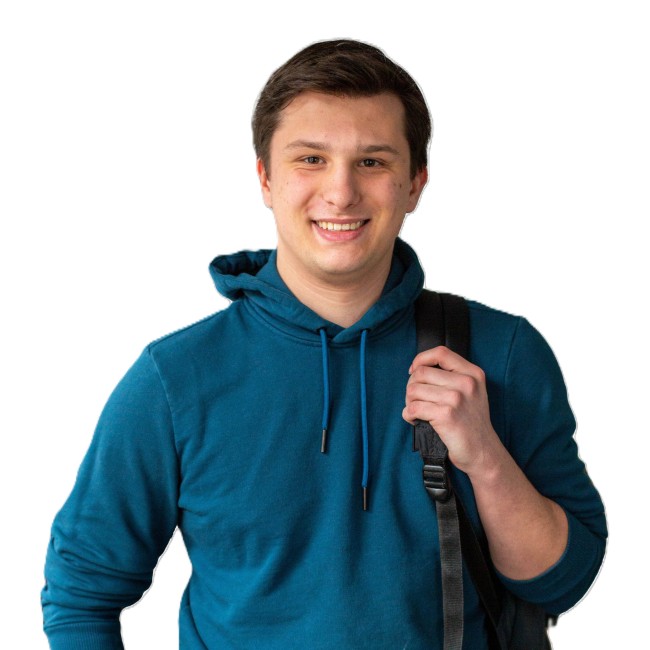
Research for one of the largest museums in the Netherlands
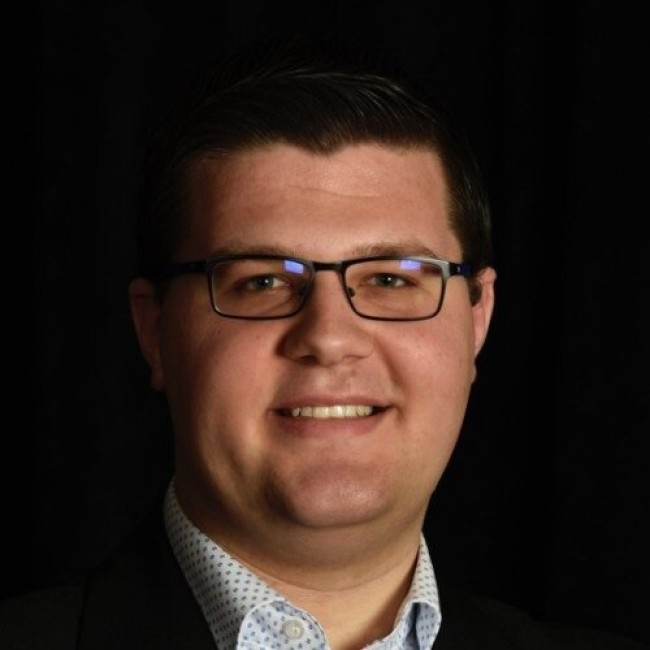
I am mainly concerned with the psychology behind experiences

I like to research why something happens

What can you do after your studies?
After graduation you approach the leisure industry from both a social and a business point of view. Career examples are: strategic manager in a theme park, policy officer in the field of culture, consultant or researcher in the field of tourism and events.
More information about options after your studies
(Left: Linda now works as a data analyst at Transavia)

Virtual campus tour
Have a virtual look and discover the Ocean building where you’ll be studying and what more the campus has to offer.
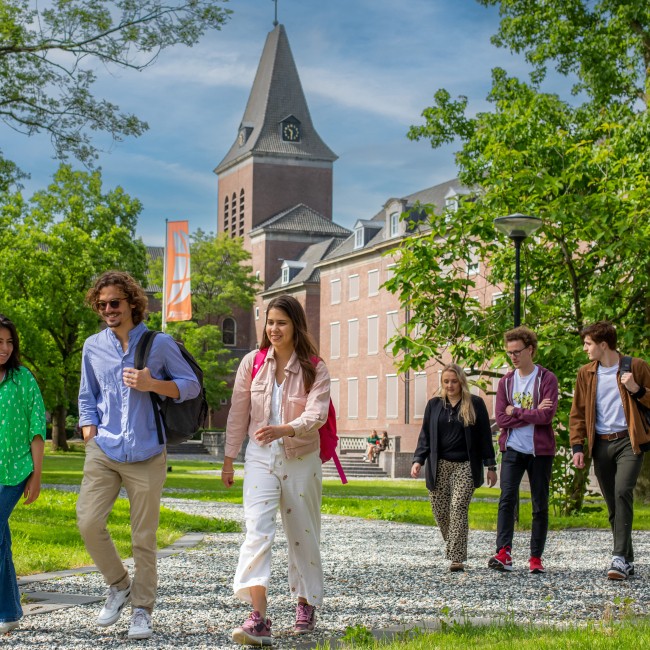
Studying at BUas
What is it like studying at BUas? What does the campus look like and what activities can be undertaken? Is Breda actually a vibrant university town?

Assistance in choosing your study programme
Do you already know exactly what you want to study or do you not have any clue at all? Find out, compare and choose your professional/ academic bachelor’s or master’s programme at BUas.

